Are you wondering how to not let things bother you? I’ve asked myself the same question many times over the years. This is what I’ve learned about letting go of small things, so you can get on with enjoying your life.
Have you ever found that you’re going about your business and feeling pretty good, when suddenly … a teeny, tiny, non-important stumbling block comes across your path and stomps on your day?
Not sure what I mean?
I’m talking about the moment when there’s no milk for your coffee, someone cuts you off on the freeway, or there’s a fifteen-minute wait at the post office.
It’s when someone forgets to say “thank you”, or leaves the laundry out in the rain, or disagrees with your taste in films.
It’s how you feel when you burn your eggs at breakfast or find out that someone ate the last of the ice cream. Or the frustration of getting yet another annoying email from a co-worker asking where to find a file AGAIN.
I used to let these little things bother me so much, but do you know what? Getting mad and frustrated only make my life harder than it needed to be. I’ve since learned there are better ways to manage my angry feelings. If you’ve ever wondered how not to let things get to you, here are my top tips.
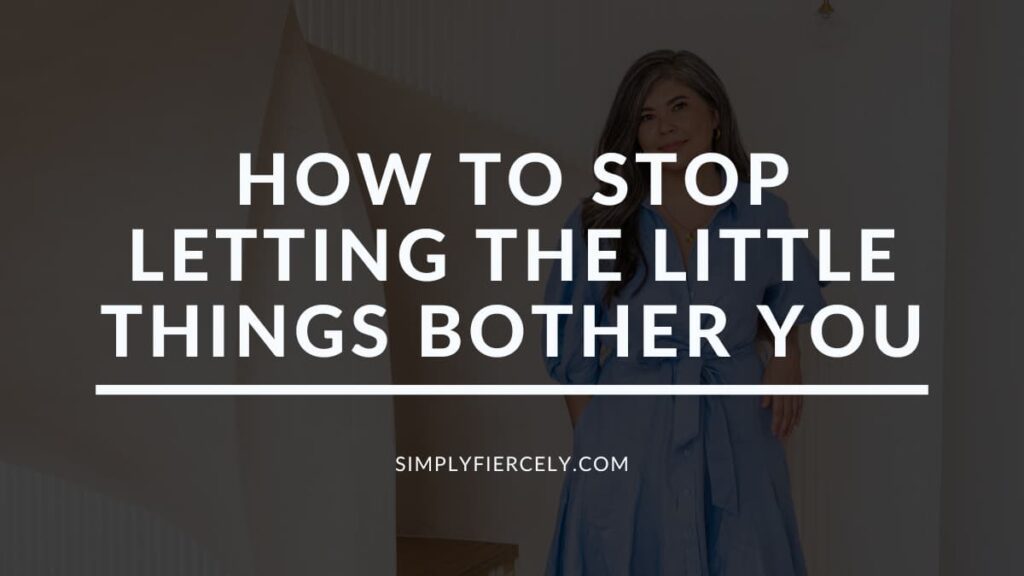
This post contains affiliate links, which means I recommend products and make a small commission on purchases at no additional cost to you. Click here for the full disclosure statement.
Understanding our feelings of anger and frustration over small things
If you’ve ever wondered “why do I let things bother me so much?“, then here’s the most important thing you need to know.
When you’re in the moment, there are constructive ways you can deal with frustration or angry outbursts. These are important because you need space to deal with intense feelings. Later in this article, I’ll share four practical tools that help me when I find myself in one of these situations.
But at the same time, I’m conscious that how I respond to stressful situations is only one piece of the puzzle.
If you truly want to stop feeling angry, frustrated and bothered all the time, the best way to begin is by looking inwards. What’s going on in your life or your mind that makes it so hard to let things go? My guess is there’s something under the surface that makes it hard to regulate your emotions.
I know because I’ve been there—but after a LOT of self-reflection, I’ve learned there are things I can do to avoid getting so upset in the first place. It’s sort of a two-part process: improving emotional regulation when I feel myself getting bothered, and also exploring my underlying condition so I’m less likely to let things get to me.
IMPORTANT NOTE: In this blog post, I’m sharing what I’ve learned as I’ve struggled with anger issues and overall grumpiness. But let’s be real: sometimes you need the help of a mental health professional. If you have uncontrolled anger, please don’t hesitate to talk to someone, especially if it leads to aggressive behaviour.
4 practical ways to stop letting the little things bother you
1. Resist the urge to complain
Believe me, I know this is easier said than done, but I’ve learned that the quickest way to keep something from bothering you is to not complain about it.
I know this goes against the popular belief that you should ‘get things off your chest’ and let me be clear, I don’t believe in toxic positivity. It’s normal to have negative feelings, but in my experience, complaining tends to magnify the situation. You draw attention to the issue and make it bigger than it needs to be.
It’s the whole, mountain out of a molehill thing, you know?
Now in full disclosure, I struggle with this, but experience has taught me that complaining is a mindless habit. It’s almost like a reflex, something I do without thinking—or when on purpose, it’s often a case of making lazy conversation.
It’s a tough habit to change but the more I pay attention (and call myself out), the better I’m getting at stopping. When I make the effort, I almost always feel better and hopefully, I act as a role model to the people around me.
If you’re struggling, why not try journaling? I’ve found it to be a healthy outlet for my thoughts, and writing about my feelings helps me process them. If you’re new to journaling, here are some tips on how to get started. Alternatively, you might enjoy these self-care journal prompts for tough times.
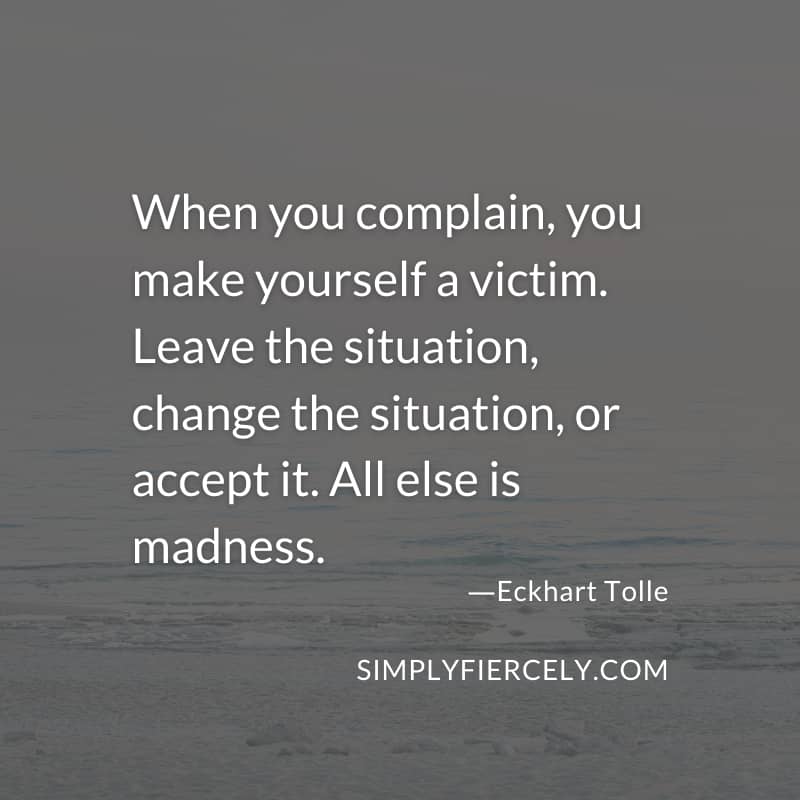
2. Look at the little picture
Sometimes I read too much into things, particularly when I haven’t go enough sleep or worse—I’m hungry!
For example, “I’m upset because someone ate the last cookie without offering me one” morphs into “I’m upset because no one here thinks about my feelings.”
The truth is probably somewhere along the lines of “Everyone is just really, really hungry and likes cookies” but when I’m worn out, I have a hard time seeing it.
And you know, it rarely matters. Regardless of why you missed out on a cookie, the reality is you can’t control the things that happen to you, but you can control how you react. It’s not always fair but the less you let things bother you, the happier you will be.
This isn’t to say you should never stick up for yourself or accept verbal abuse, but you should choose your battles—or at a minimum make sure there’s actually a battle there to fight!
One quick and easy way to be less bothered is to reframe the situation. Try focusing on the ‘little picture’ by paying attention to what’s bothering you and framing it in its simplest form. For example:
- Instead of “The service in this restaurant is horrible!” (Outrage!)
- … try “I’m upset because my waitress forgot to refill my coffee.” (No big deal)
- Instead of “No one here respects my time.” (Sobs quietly at your desk)
- … try “I’m upset because I asked a question in my email and he didn’t answer it.” (Poor attention to detail, forgivable at 8 am on a Monday morning.)
When you choose to focus on the little picture, you choose not to let little things upset your day. Or eat a cookie—low blood sugar levels aren’t good for anyone!
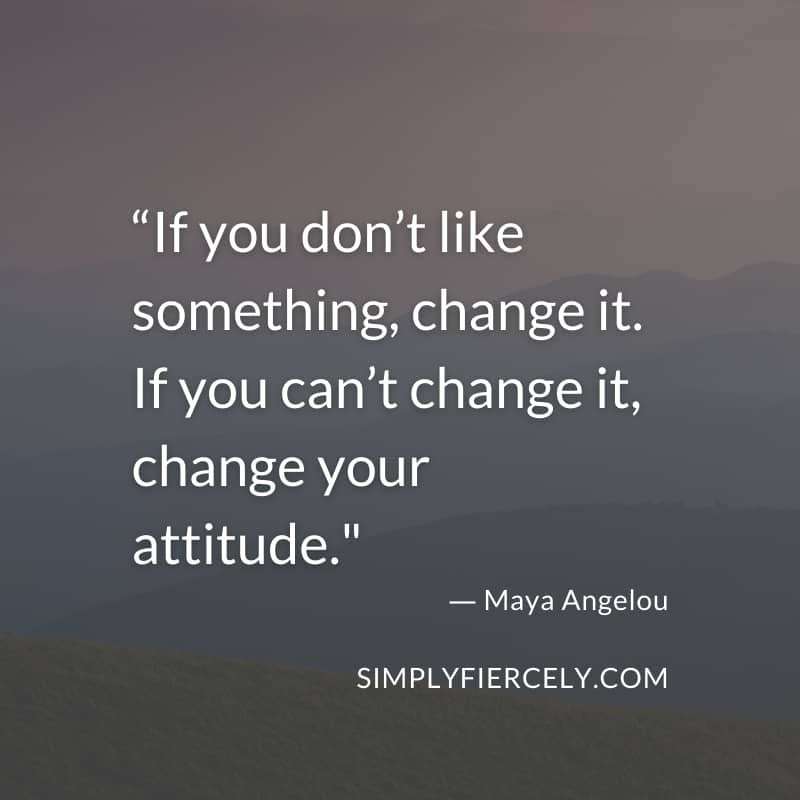
3. Choose compassion and focus on humanity
If you find yourself getting upset with someone—from a family member to a co-worker you hardly know—you can fight feelings of annoyance by choosing compassion and focusing on their humanity.
Now I know, this sounds a bit ‘woo woo’ but stick with me. Because as easy as it is to get annoyed with people, it’s never a nice feeling. Sometimes you have a good reason and other times less so … but if you don’t want to fall victim to extreme irritability then give this tip a try.
When someone invokes an angry response from you, try to think humanising thoughts about that person.
This tip was inspired by Brandon from the Humans of New York, where he shares photos of strangers along with their stories. It’s intimate; somehow he manages to get people on the street to share private thoughts, from their darkest fears to their greatest hopes.
In a world where the comment section of any social media post is usually overrun with angry people, this slice of the Internet has taught me that we think of people with more kindness when we know their stories.
And we can use this knowledge to be more compassionate in daily life. The next time you get annoyed with someone, shift your focus away from whatever did to upset you and instead, think about their stories.
If you don’t know the person well, look for small details: think about how John from accounting always holds the door for you, or how the lady in the supermarket queue is speaking kindly to her daughter.
These little moments act as reminders that the person you’re annoyed with is an actual person, with feelings and struggles just like you.
Add to Your Reading List: Humans of New York: Stories by Brandon Stanton (affiliate link)
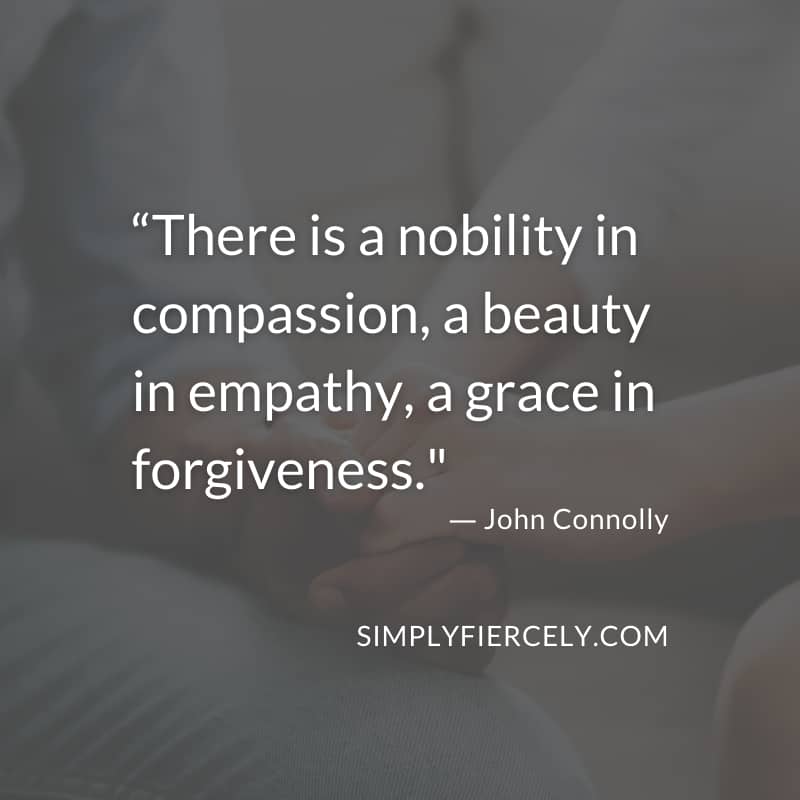
4. Let go of expectations
I often have a picture of how I hope my day will go when I wake up. I imagine walking into my office early, making a nice hot cup of coffee, and having a fantastically productive morning. Sounds pretty good, doesn’t it?
But in reality, sometimes life gets in the way. I can’t find my keys and I’m late out the door, there’s no milk for my coffee, and when I finally get to my desk, I’m flooded with emails.
Next thing I know the morning is half over, I’ve had NO coffee and I’ve done nothing on my to-do list.
At this point, it’s tempting to write the day off as a ‘bad day’. When you have high hopes and things don’t go as planned, it’s disappointing and often leads to a short temper. But one thing I’ve learned is our expectations can cloud the reality of the situation.
If you let go of your expectations and open your mind, you might notice that yes, the day is off to a slow start, but it’s far from over. There’s still plenty of time to turn things around, but only if you choose not to sweat the small stuff.
Instead, try pausing for a moment and asking if you’re letting your expectations affect the experience. You might find yourself giving in to negativity when there’s really no reason for it.
The Simply + Fiercely Show is a podcast for women who want to clear their clutter and create space for freedom and joy. If your life keeps getting bigger—but not better—then it’s time to declutter from the inside out. LISTEN NOW
How to avoid getting angry and frustrated in the first place
The above tips are what help me calm down when I find myself getting angry over small annoyances. But now I want to share some of the things that me feel less bothered or upset in the first place.
Because here’s the thing: if the little things are always getting to you, then it’s probably a sign of deeper problems. What’s going on with YOU that’s causing you to get so upset easily? Why do you struggle to let go of anger?
These questions aren’t easy to answer, but when you spend time getting to the root cause of your feelings, the payoff is worth it. Not only are you less easily bothered by tiny things, you also feel better about life in general. Or at least, that’s been my experience.
Here are a few things that had a major impact on my life. This is not an exhaustive list, but if you’re in a similar situation, it might help you understand the real issues and how to work through them.
1. Practice self-care
This is SO important. I’ve noticed that when I don’t take care of myself, then every little thing bothers me. I’m tired, cranky, and irritable—and I take it out on the people around me.
If you can relate, then the solution is prevention. Practice self-care before you’re completely worn out and you can avoid getting to the stage where everything gets under your skin.
Now, I know it’s easier said than done, but give it a try. Keep your stress levels under control, get enough sleep, and eat healthy meals; you know the drill. My guess is it’s less about knowing what to do and more about making it a priority!
But it really is so important for your mental and physical health, so give it a try for just a couple of weeks and see how you feel. And if you need a few resources to get started, check these out:
- My top practical self-care tips (a must-read if the idea of self-care overwhelms you and you’re not sure how you’ll make time to get it done).
- Here are 5 ways to use your journal for self-care. Journaling has had a massive impact on my life, and I highly recommend it to everyone.
- This is my FAVOURITE self-care journal (affiliate link). It’s perfect for helping you let go of the past so that you can move forward with grace.
2. Practice self-compassion
A few years ago, I started wondering why I got angry so easily. Something was always bothering me, and I didn’t know why.
But then I noticed a pattern …
When I’m angry or upset with myself, it often manifests as anger or frustration with others.
Every little thing was bothering me because I was already feeling triggered. If this resonates with you, then self-compassion is the answer. When we’re kinder to ourselves, it’s easier to be kinder (or at least patient) with others.
Here are a few things you can do to get started:
- Stop comparing yourself with others.
- Check out these tips on how to be kind to yourself.
- Here are a few gentle reminders for when life gets hard.
Add to Your Reading List: Self-Compassion: The Proven Power of Being Kind to Yourself by Dr Kristin Neff (affiliate link)
3. Create space
When your life is busy and cluttered, it can feel like the world is closing in around you. You’re stressed and overwhelmed—so when the littlest thing goes wrong, it feels like a mountain in your path.
If this hits a little too close to home, then I encourage you to simplify your life. As a reformed shopaholic turned minimalist, I know the power of letting go.
Clear your heart, your home and your mind—and watch what happens. I can almost guarantee that with more space in life, you’ll be better equipped to handle life’s little annoyances.
If you’re not sure where to begin, here are my top tips on getting started with minimalism. (And by the way—it’s NOT about getting rid of all your stuff. Instead, it’s about curating your life so that your stuff is SERVING you.) I’ve also put together this round-up of my top decluttering tips for your home and life.
Add to Your Reading List: Goodbye, Things: The New Japanese Minimalism by Fumio Sasaki. This is a beautiful, non-judgemental book about simplifying your life! (affiliate link)
4. Live life to the fullest
And finally, I encourage you to focus on living your life to the fullest. I know that’s a cliche that gets thrown around a lot, but I truly believe in it.
Stop living for the weekends and instead, look forward to all the beauty in your life. When you do, you’ll be less distracted by all the little things that don’t matter.
Add to Your Reading List: Emotional Agility: Get Unstuck, Embrace Change, and Thrive in Work and Life by Dr Susan David. (affiliate link) This book has been LIFE-CHANGING and I cannot recommend it enough.
It takes time but slowly, I’m learning to be less angry and frustrated when I don’t need to be—and I know with time, you can too. Be kind to yourself and take life one day at a time. We’ve got this!
How do you deal when the little things start to get to you? I’d love to hear any of your ideas or it would be great to know if any of these methods help you. Let me know in the comments! x
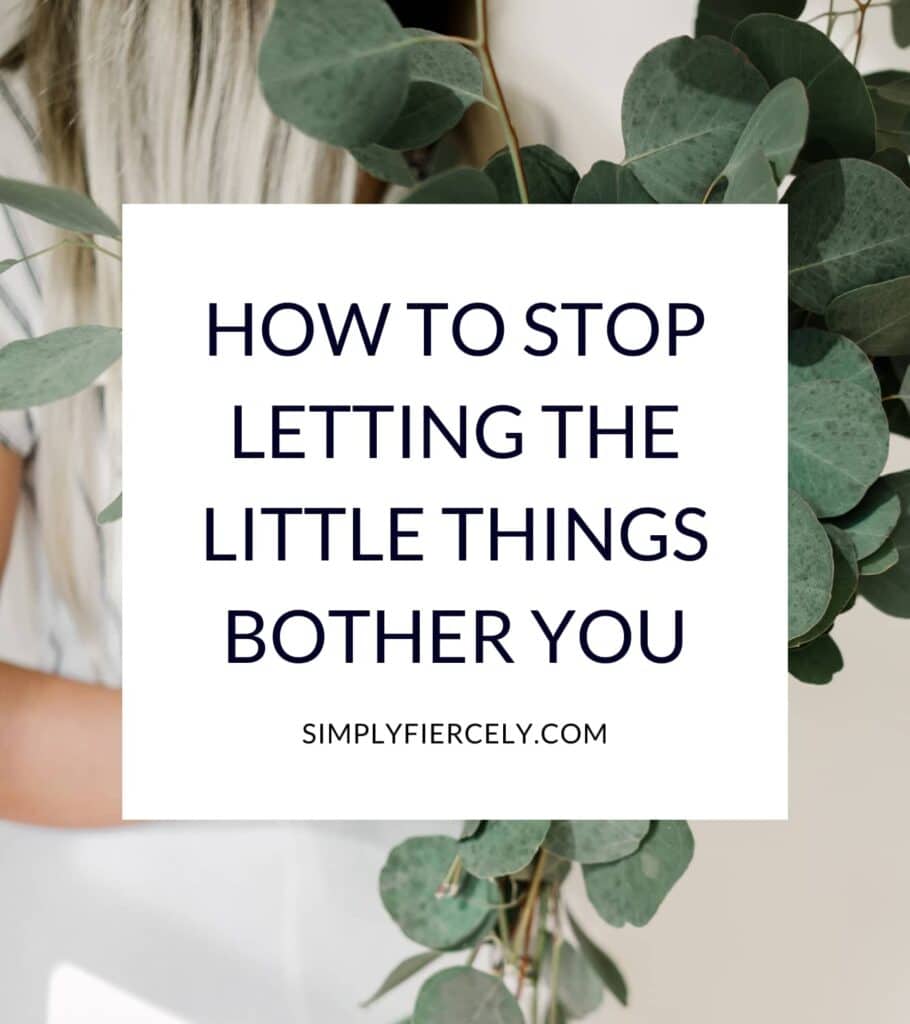



Thank you for this article. I wrote down all of the tips and plan to use them in my everyday life.
That’s so wonderful to hear! Wishing you all the best, and thank you for reading.
this was a thoughtful article written with care. Many of these points resonated with me in my daily life. My biggest tip would be expressing yourself in a frustrated way is almost certainly going to have less effect and might even backfire compared to expressing yourself with poise. IE, feel however you feel and accept it in the moment but don’t let that emotion manifest into negative behavior.
Thank you so much for writing this article, I really needed this and will definitely try some of these tips. Im also so happy you left a section to comment because I was just thinking I wish I could thank the author.
Hi
I so grateful to come across your article. It’s like you wrote about me. Thanks for the tips. Journalling works for me
Hi Jennifer
Thank you for providing much needed perspective.
I am at a point in life where I am constantly annoyed, angry, emotional and overly sensitive. The little things pile up and result in angry outbursts, anxiety and it feels like I am carrying emotional baggage. I feel so bad and disappointed in myself after being angry.
I understand that I am overworked and just tired mostly, which is why I am angry.
By reading your article, it was like I was reading a reflection of myself; so the reasons why provided much needed perspective.
I really appreciate the list of tips in handling my triggers.
Thank you once again, as you truly have helped me.
Stay blessed always. 😊💚🌼
You’re very welcome! It’s so hard, especially these past few years. Be kind to yourself and take care. xx
Hi Jennifer
This is an amazing article. Many of us struggle to come out of things despite trying meditation, breathing and such. Not always possible to see a therapist at COViD times. You are spot in with your analysis and eager to try things suggested ; tweaking the thought process.
Keep going with these wonderful articles !
Spot on I mean ..
Thank you! And you make the wonderful point that getting professional help is always a good idea. But unfortunately, not everyone has access, so I try to share what has worked for me. Thanks for reading! ☺️
Nicest article I have come across in a long time. I also have triggers due to my past. Including: a touch upbrinnging, racism at school and bullying as a teenager. It took me time to become firm and speak my truth. Yet years later it has now come to a point where everything bothers me and I always am on the defense. I literally let EVERYONE ruin my day especially when I endure hideous customer service, traffic jams and horrendous lines. Learning to power through despite these difficulties is for me a constant struggle.
I have struggled with this for a long time. I carry a lot of weight for my entire family and often times I know I let little things bother me. I got no respect or love from my parents, not even an apology for the abuse, and now with my own kids I feel I get no respect and it’s hard because every little thing they do I consider to be disrespectful. Leaving food in the sink equates to I’m not loved or appreciated. I know I have to fix this…I just don’t know how.
I’ve noticed that when family is in my personal space I immediately tense up and I can’t focus or work. Sometimes I start thinking about my life problems and it can get to the point of tears. They don’t have to be doing something wrong to piss me off, but their presence will ruin my entire mood, efforts, and performance. (It could be something important like school work or just something personal like painting). It’s like my brain thinks that my family members are dementors or something and it goes “trouble trouble” even if it’s just my mom going to the kitchen to get a snack. I can’t change my family. I can’t change the vast majority of my circumstances, my family controls that. The only thing I have to myself and complete control over is my thoughts. Please help me find some way to change my thoughts so they stop messing up my life. I’m tired of hearing that my parents need to change or that I need to change certain aspects of my life. I want to look for solutions that are actually feasible because I’m just tired of it.
Hey Zeyda, it sounds like you’re in a really tough situation, so first—big hugs! Secondly, do you think that something from the past is triggering you? As you said, sometimes we can’t change our circumstance, but we can change the stories we tell ourselves. This post I recently wrote might help: https://www.simplyfiercely.com/let-go-of-the-past/ Take care x
I’ve been feeling so stuck with this for a while now. I’m so grateful to have found your article. Thank you so much for sharing your wisdom and such an abundance of resources <3
Thank you so much for reading Jessica x
Hi Jennifer,
Thank you so much. I just stumbled on your article because small things like people not acknowledging my best wishes bothers me when they have time to reply to others. Another one is not using caps while mentioning my name but they use caps for few others. So I just googled today why small things bother me and I already found this question on google which means many people are like me. Your article is great and gave me little bit of clarity. Difficult task but will try and practice self care and how to expect less from others for better mental peace. Thank you so much 🙏
Not letting things get to me is fucking impossible, no matter how hard I try.
I get it, it’s hard. But you won’t get anywhere with that attitude. Have patience with yourself and adopt a growth mindset
Hi Jennifer. Went through your post. Got really some good points to think upon. I too start to worry about little things in my family, my surroundings… And get depressed. I really need to pay attention on this because, it’s being very painful for me. The impact of this lasts longer and I can’t be normal for hours. I have to read your other blogs and seriously start following the points which you have discussed. To expect less and see the situation as it is.
Nice read.
Hey Jennifer,
I am So grateful for stumbling upon your page just now!!! Recently something has happened and I have had a overwhelming change come out of nowhere. The thoughts of a complete life change ran through me so fast and I now have applied so many things to this change and my thoughts are SO CLEAR and my mind SO FREE. (where i now searched “How to let the small things go”.) How refreshed I have felt lately for changing my perspective from the way i perceive something to the possible many ways it actually could really be. Then I read one of your pages. I also wanted to say, you seem to mention being an inspiration to Woman, but i believe you are an inspiration to ALL. Although i am a 41 year old male I am subscribing and signing up anyways !!! 😉 Hope you don’t mind 😉 LOL… Keep it up! Your truly a blessing!! P.S- Next stop…. Liking your Facebook page 🙂 Yay!!!..
Your article is practical and applicableand simple. However, my anger is anything but. My husband lives in constant fear that I will go ballistic at any time over a relatively minor incident. I hate the fact that I create that kind of atmosphere, regardless of where we are. I siffer from depressio and am on meds. I want to understand WHY I am unable to comtrol the anger or why it manifests in the first place. To be clear I am talking about things like bimping my head on a cabinet door or the pans not nesting correctly or having trouble clicking something on my phone (big one). And to make things worse this is the exact disposition my mother had and I would rin and hide when she would launch into a tirade. I despise this. I think I get angriest when something goes “wrong”‘ while trying to eccomplish a task. I know when it is happening that is has the potential to go real bad but feel absolutely powerless to stop it. Perhaps I need more help than you can provide. Thank you anyway.
Have you looked into SPS personality trait? You may be a highly sensitive person. The reactions which you described sound just like mine, and i hate the way a ‘small’ thing can ruin my day. I consider myself to be highly sensitive, and this may give you a lead to understanding your ways..
Hi Connie, I know that this is a late reply, but I recently read a book called Emotional Agility by Susan David. It helped me a lot and I think you might find it helpful too. All the best x
You
Hi Connie,
I know this was from quite a while ago but I was wondering if you found anything specific that helped you because what I just read I could have wrote myself and its becoming a problem between my husband and I. I’m just so lost on where to start or what to do.
Thanks!
Marissa
‘See the little picture’ is the one that helped me.
But it’s not useful with people who are abusers (in different forms). To those you gotta step up strongly and stop the abuse, otherwise they don’t stop. And understanding to them is an awful idea.
Hey Jennifer !! The above-mentioned points are fairly easy to implement. Actually, I think I have come to the above stage where its easier to not get sooooo thrown off-gear as I used to be earlier. Vippassana, a meditation technique has helped me calm down. Besides, I myself am taking efforts to rewire my thinking process. Instead of visualising conflicts, arguments etc, I affirm Positivities. I feed myself lot of Positive stuff from all sources possible. Also, look up posts like these. Thanks soo much for the tips again. Cheers !!
I usually get upset with small things and this lasts for long hours (i.e. 24 hours). It mostly happens when I am too much tired or have lack of sleep. This article has shown me some ways on how can I fight with this issue and make my life much better. Thanks for writing..
Same here. What is the solution?
This morning, I reacted to my boyfriend dropping a disc from a package I had just gotten and it changed my whole mood! I went from feeling happy to feeling like I was in a very bad mood. I wanted to scold him more and more, but I went into the bathroom and grumbled, and then I came out and googled something about getting irritated ruining my whole mood and came across your article. What I got out of it is that I need to get back to practicing mindfulness and challenge the responses I have become automatically disposed to. The other thing that happened was that the awareness your article gave me flipped the switch back to me being in a better mood again. Thank you.
I really enjoyed your post today. Something happened that made me realize I have a hard time letting go of things and I have been a self improvement junkie for years so I was shocked that I’m still doing that. So I googled it and came across your beautiful article. Thank you
you also mentioned that being quiet in your mind still is a struggle for you so I thought I’d share with you something that really impacted me in that area. someone told me about Vipassana. It’s a 10 day course on meditation. I had failed for years at being able to drop my mental chatter so the idea of 10 days focusing on just that seemed like a really good idea and so I signed up went. The entire course is completely free of charge, they feed you and give you a room to sleep in but is quite comfortable by the way and the food is amazing. It was the most enjoyable and memorable 10 days of my entire life and by day for my mental chatter he dropped away and I came away with a practice that continues to keep my mind at bay, allows me to be in charge of it instead of the other way around. I did my course in Pomona, Queensland, however there are courses all over the world. I thought compelled to share it with you and your readers. Perhaps you’ve already done it and written an article on it, and if so my apologies. Otherwise check it out and I’d love to know what you think about it. Thank you so much for your insights. I so appreciate you sharing your experiences . ?
hi Jennifer,
I really liked your suggestions. i struggle with letting go of my anger & ego-hurt at times and end up instinctively dissecting it to sort it out. It does help to analyse & introspect and make sense of it but there is a big time cost involved in daily life. so, i have decided to think rationally & quite a no. of times that involves letting those feelings go in that moment at least. and i think your suggestions can be some of the ways to actively do it in significant no. of such situations…esp, when it involves a loved one.
wish u the best of luck in your endeavours!! 🙂
I feel exactly like you – lots of introspective thoughts, analysis, and discussions with friends about the injustice of it all….I think it makes the situation worse…..this time, I decided to give it a couple of days before I act, and…..well, it’s great! I just calmed down within the 48 hours and now I feel no compulsion to bring it up to the person in question. Go me! 🙂 Thanks Jennifer – great article!
I did not find your post helpful. I would like my money back……just kidding, I liked it.
Thank you for the article! I can definitely relate and i will try your tips for getting over little annoyances. I think the reflecting then reacting advice will really help!
Hi Sonam! I’m so glad you found this post helpful and thank you for reading. Have a great day! xx Jen
Hi Jennifer,
I know this post is more than a year old, but I found it in a search of “how to let little things go” and yours is by far the best article I’ve stumbled on for realistic steps to take to put yourself in a better mindset. Like you, I consider myself a very optimistic, future-thinking person, but have been plagued with teeth-grinding impatience and annoyance over the dumbest stuff lately! Thanks for putting me in the right mindset and happy 2017.
Hi Carey, I’m so sorry for my slow response to your comment, but THANK YOU so much for your lovely feedback. It really means a lot to me!! x Jen
Hi Jennifer,
I just wanted to say your blog was the most helpful thing to me I have found. I have had a massive problem with overthinking and not letting things go, especially things I am passionate about so that includes things that upset or anger me. However I know there is a better way to handle things, and while I know that a lot of things I am reacting to I am probably in the right, it does not mean that my reaction to it is. Although I do also know that this is much easier said than done, there have been countless times where I want think this to myself constantly but it’s like I just can’t help it. What are some tips for making sure you constantly apply this to your every day life?
Hi Sope! Thank you so much for your sweet comment and I apologise I’ve been so slow to respond! Before I answer your question, I first wanted to say I completely understand. Just because I wrote this post and my logical brain knows what’s best doesn’t mean my heart always listens. I’d be lying to you if I said I constantly apply this in my life!
Having said that, I’m definitely more vigilant than I used to be and it all comes down to self-awareness. The 2 things that have helped me most are: 1) meditation – it helps me slow down my thoughts, so I have a chance to calm down and think logically before I get upset and 2) journaling – I make mistakes all the time, but journaling gives me space to reflect and learn from my actions.
I hope these tips help you. It’s definitely a learning process and things don’t change overnight. Just keep trying – tiny changes every day really do add up!
All the best!! xx Jen
Hi Jennifer, I enjoyed reading the article. I just have a question about your first tip, not complaining. I agree with you but I don’t really know the difference between venting and complaining. Sometimes I feel I can’t let something go unless I have complained/vented to someone about it, otherwise I just stew over it in my mind. What are your thoughts on this? Is there a diff between complaining and venting and if so, is venting ok?
Hi Amanda,
Thanks for your comment. I do think there is a difference between complaining and venting … it has to do with your intention. When you complain, it’s often mindless – sometimes you don’t even realise the words coming out of your mouth! When you vent, you more aware of what you’re saying.
For example, complaining is coming home at the end of the day and going on and on to your partner about how horrible you day was as soon as you walk in the door, or turning to a coworker every time you get an annoying email and going on about it.
With venting, you choose your place and time, let the person you’re talking to know the purpose of the conversation (“I just need to get this off my chest”), and then you say your piece and move on.
This is just my opinion! I think venting can be healthy – but we also need to be careful of how often we do it and what we’re talking about. Not everything needs venting; instead, sometimes we just need to take a few deep breaths!
Thanks for reading! I hope this helps 🙂 x Jen
PS: I’m still working on this one. A LOT!
Boy, did I read this at the right time! Thank you for the wise words and advice. Very helpful!
Thanks Christine! I’m glad you found it useful 🙂 – Jen
This is honestly one of the best tips of advice I have read on this topic! It totally changed my day and possibly my life. Thank you so much!
Wow Therese! I’m so sorry by my late response – but I’m so honoured by your response. I’m so glad that this has helped you!! ❤️ Thank you so much for letting me know xo
I just finished reading this, and I honestly think it just changed my life. I got into an argument with my Significant Other this morning, and if I would have just had these 4 things to keep in mind, it would have went totally different. I’m ready to make a change for the better and I really think that this article is helping me jump start that change. I can’t thank you enough for sharing.
Wow Jessie, thank you so much for your kind words and for sharing your story! You’ve absolutely made my day!!
And In full disclosure, I still struggle with putting a lot of this into practice in my own life, so thank you – your comment has been a great reminder for me to listen to my own advice. x
Hi Jennifer, it’s been a few weeks since I last visited, & I’m enjoying catching up on your posts. I like what you said about the little things; perspective is everything & often reminds us everything’s still fine after all.
Such a great post! It’s amazing how the little bothers of life so often tend to be magnified and made into huge deals – I know I’m guilty of this. The thing is, life is made up of millions of “little bothers”! It all boils down to how we respond to them.
Yep, guilty! 🙂
I tend to get annoyed by those little things and my whole mood or day gets off kilter. I just try to remind myself of all those positive things I saw, did, or encountered.
Love your advice on humanizing other people. What you get irritated with in others you gloss over in yourself.
“What you get irritated with in others you gloss over in yourself.” Oooh, I love this! And it’s so true, definitely something to think about. Thanks so much for sharing Wendy.
This is so brilliant. And yes, I’ve totally felt that rush of anger come on so suddenly… most of the time it happens when I’m on the road here in LA. People are such unsafe drivers!! But you’re right– there’s nothing I can do that can really change their behavior; and being angry at them only makes my own mood foul. Each of the steps you listed here are so useful! Thanks for writing this.
Hi Daisy, thank you for your sweet comment. It’s a relief to hear I’m not the only one who gets worked up sometime … although I’m pretty sure LA traffic is a good reason! I’m really glad you found this useful 🙂